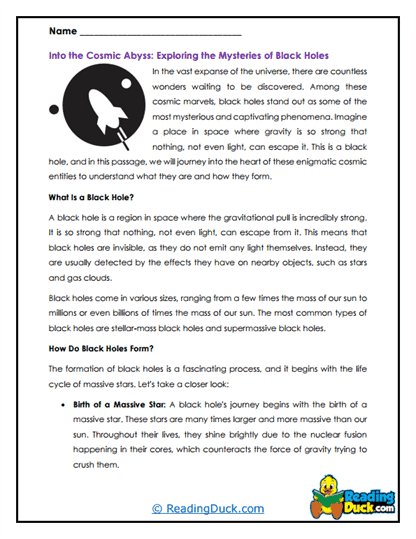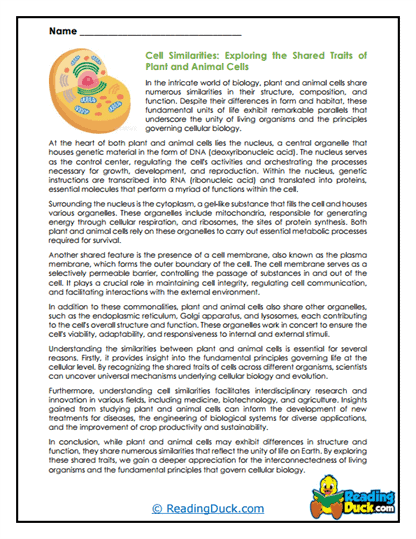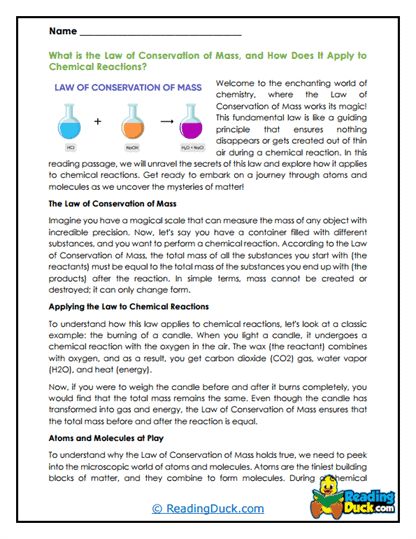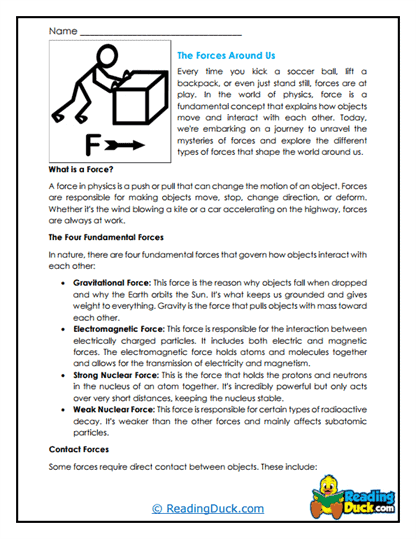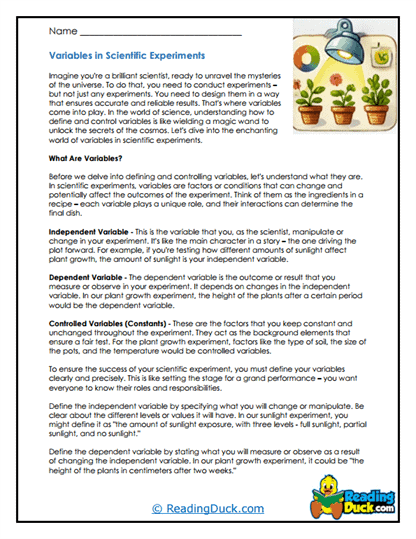Science Worksheets
About Our Science Reading Worksheets
Welcome to our comprehensive collection of Science Reading Comprehension Worksheets! This collection is designed to provide students with a solid foundation in various scientific disciplines while enhancing their reading and comprehension skills. The worksheets cover a wide range of topics within the major branches of science, making them a valuable resource for students who are keen to explore the wonders of the natural world.
The collection is organized into five major categories: Astronomy, Biology, Chemistry, Earth Science, and Physics. Each category includes various topics that delve into specific areas of study within that branch of science. For each topic, there are several worksheet sets designed to reinforce understanding and encourage critical thinking. Here’s what each worksheet set includes:
- Multiple Choice Questions: These questions test students’ recall and comprehension of key details from the reading passage, prompting them to engage with the content and think critically about the material.
- Short Answer Questions: In this format, students are required to articulate their understanding in their own words. This helps them develop their analytical and writing skills while reflecting more deeply on the material.
- Open-Ended Questions: These questions invite students to share their personal interpretations, opinions, and preferences related to the content. This format encourages creativity and allows students to connect more personally with the science topics they are studying.
These varied question formats are designed to assess students’ understanding and enhance their connection to the scientific concepts being explored. An answer key is provided for every worksheet set, making it easy for teachers and parents to guide the learning process. All of the worksheets are available in PDF format, which can be easily viewed electronically, downloaded, and printed out for classroom or home use.
Overview of Topics in This Worksheet Collection
Our Science Reading Comprehension Worksheets cover a broad spectrum of topics across the major branches of science. These categories were chosen to provide students with a well-rounded education in science, enabling them to build a strong knowledge base and develop a passion for scientific inquiry. Here’s an overview of the major categories included in this collection:
- Astronomy:
- Astronomy is the study of celestial objects and phenomena beyond Earth’s atmosphere. This category covers topics such as the solar system, stars, galaxies, and the universe as a whole. Students will explore concepts like planetary motion, the life cycle of stars, and the mysteries of black holes. Astronomy worksheets help students understand the vastness of space and the fundamental laws that govern the cosmos.
- Biology:
- Biology is the study of living organisms and their interactions with the environment. This category includes topics such as cell biology, genetics, ecosystems, and human anatomy. Students will learn about the structure and function of cells, the principles of heredity, the diversity of life forms, and the intricate systems that sustain life. Biology worksheets provide a deep dive into the mechanisms of life and the importance of biodiversity.
- Chemistry:
- Chemistry is the study of matter, its properties, and the changes it undergoes. This category covers topics such as chemical reactions, the periodic table, atomic structure, and states of matter. Students will explore how elements combine to form compounds, the principles of chemical bonding, and the role of energy in chemical processes. Chemistry worksheets help students grasp the building blocks of matter and the interactions that drive chemical phenomena.
- Earth Science:
- Earth Science is the study of the Earth and its processes. This category includes topics such as geology, meteorology, oceanography, and environmental science. Students will learn about the structure of the Earth, the forces that shape the planet’s surface, weather patterns, and the impact of human activity on the environment. Earth Science worksheets encourage students to explore the dynamic systems that make our planet unique.
- Physics:
- Physics is the study of matter, energy, and the fundamental forces of nature. This category covers topics such as motion, force, energy, waves, and electricity. Students will explore the laws of physics that govern the behavior of objects, the nature of light and sound, and the principles of electromagnetism. Physics worksheets help students understand the physical laws that underpin the universe and the technology we use every day.
These major categories encompass a wide range of scientific topics, providing students with a comprehensive understanding of the natural world. By exploring these categories, students can develop critical thinking skills, scientific literacy, and a deeper appreciation for the role of science in everyday life.
The Importance of Science Literacy in Education
Understanding science is crucial for students’ academic and personal development. Integrating science into the curriculum helps students develop important skills and knowledge that are essential in today’s world. Here’s why science education is so beneficial:
- Encourages Critical Thinking:
- Science education teaches students how to observe, analyze, and interpret data, which enhances their critical thinking and problem-solving abilities.
- Promotes Curiosity and Inquiry:
- Science fosters a sense of wonder and curiosity about the world. It encourages students to ask questions, explore new ideas, and seek out answers through experimentation and observation.
- Builds Scientific Literacy:
- Understanding scientific concepts and principles is essential for making informed decisions in a world increasingly shaped by science and technology.
- Enhances Understanding of the Natural World:
- Science education helps students understand the processes that govern the natural world, from the smallest particles to the vastness of the universe.
- Prepares Students for Future Careers:
- A strong foundation in science opens up opportunities in a wide range of fields, including medicine, engineering, environmental science, and technology.
How Teachers and Parents Can Integrate These Worksheets in a Learning Curriculum
Integrating Science Reading Comprehension Worksheets into the curriculum can greatly enhance students’ understanding of scientific concepts while improving their reading and comprehension skills. Here are some practical tips for teachers and parents:
- Use in Science Classes:
- Incorporate the worksheets into regular science lessons to reinforce key concepts and provide students with opportunities to apply what they have learned. This can help solidify their understanding and encourage active engagement with the material.
- Assign as Homework or Independent Study:
- Assign the worksheets as homework to reinforce classroom learning or as part of an independent study project. This allows students to explore topics in more depth at their own pace, fostering a deeper understanding of the material.
- Cross-Curricular Connections:
- Connect the science worksheets to subjects like math, reading, and technology. For example, use the physics worksheets to explore mathematical concepts such as velocity and acceleration, or incorporate reading comprehension skills by analyzing scientific texts.
- Group Discussions and Projects:
- Encourage students to work in groups to analyze the reading passages and present their findings to the class. Group discussions and projects can foster collaboration, enhance communication skills, and promote a deeper understanding of the scientific concepts being studied.
- Use in STEM Programs:
- Integrate the worksheets into STEM (Science, Technology, Engineering, and Mathematics) programs to help students build a strong foundation in science and develop the skills needed for success in STEM-related fields.
- Parental Involvement:
- Parents can use the worksheets at home to support their child’s learning. Discuss the reading passages together, explore additional resources, and engage in hands-on science activities that complement the topics covered in the worksheets.
- Interactive Science Experiments:
- Pair the worksheets with hands-on experiments or demonstrations that relate to the topics being studied. This can help students connect theoretical knowledge with real-world applications, making the learning experience more engaging and meaningful.
Brief Overview of Benefits
Studying science through these worksheets enhances a range of academic and personal skills. Students develop critical thinking by analyzing scientific data, curiosity through inquiry-based learning, and scientific literacy by understanding key concepts. Additionally, the worksheets improve reading comprehension and provide opportunities for interdisciplinary learning, making them a valuable addition to any curriculum.
In conclusion, our Science Reading Comprehension Worksheets offer a comprehensive and engaging way to explore the fascinating world of science. By integrating these worksheets into the curriculum, teachers and parents can help students gain a deeper understanding of scientific principles while developing essential academic and personal skills. Through a combination of reading, analysis, and hands-on exploration, these worksheets offer students the tools they need to connect with science on a meaningful level and prepare for future academic and career success.
